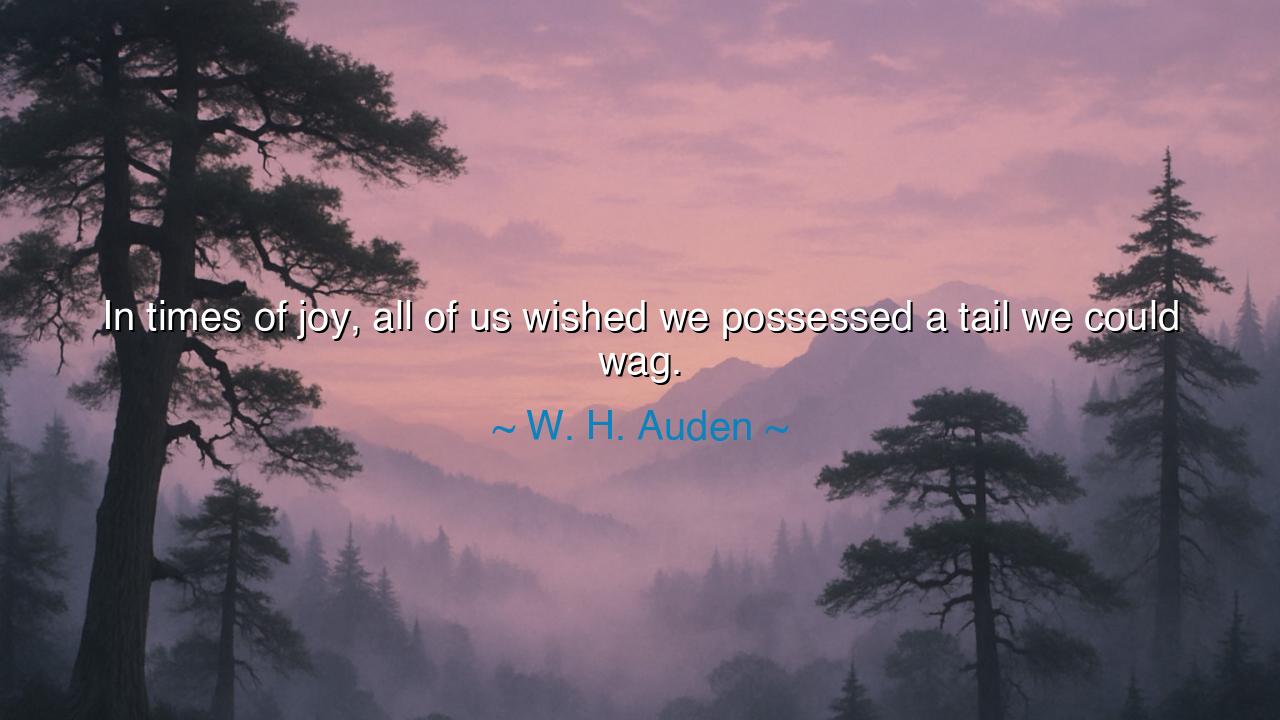
In times of joy, all of us wished we possessed a tail we could






The poet W. H. Auden once wrote, “In times of joy, all of us wished we possessed a tail we could wag.” These words, seemingly lighthearted, are in truth a window into the ancient soul of humanity. They speak to the yearning within every living being to express pure, unfiltered joy—a joy that transcends language, reason, and even pride. In the wag of a dog’s tail lies something that men, with all their intellect and artifice, have long lost: the innocent freedom to be happy without fear of judgment.
In this saying, Auden observes the simplest creatures and sees in them a truth greater than philosophy. The tail is a symbol of unhidden delight, of the soul’s instinctive gratitude toward existence itself. The dog wags not to impress, nor to calculate gain, but simply because its heart overflows. It has no need to disguise its affection, no mask to wear before its companions. In the wagging tail, we find the divine honesty of emotion—something humanity once knew when it lived closer to nature, before it clothed its feelings in armor and called it civility.
The origin of this quote may be traced to Auden’s lifelong fascination with human nature—how we suppress our truest impulses in the name of propriety. He saw that man, for all his progress, remained a creature who envied the freedom of beasts. Ancient philosophers, too, would have nodded in agreement. For was it not Diogenes the Cynic who lived as a dog among men, proclaiming that to be natural is nobler than to be pretentious? In Auden’s words, that same yearning echoes—the desire to reclaim what is simple, pure, and spontaneous in our hearts.
Consider, for a moment, the story of King David dancing before the Ark of the Covenant. In that sacred moment of triumph, the great king cast aside his royal robes and leapt with abandon, his joy too vast for dignity to contain. His wife looked upon him with scorn, but David replied, “I will yet be more undignified than this.” He had, in that instant, a tail he could wag—not in body, but in spirit. He let his joy become visible, tangible, free from the chains of decorum. That is the power Auden speaks of: to let one’s inner light spill into the world unrestrained.
How often, in the modern age, do we smother our happiness beneath layers of restraint? We smile cautiously, we celebrate modestly, we fear being misunderstood. We have traded authenticity for composure. Yet the soul was not made for quiet joy alone—it was made to rejoice, to burst forth like spring after a long winter. The tail we lack is not a physical one; it is the lost courage to express our delight fully, with the innocence of a child or the faith of a creature that trusts life itself.
To live by this wisdom is to allow joy its rightful place among the virtues. When gladness visits, welcome it without shame. Laugh freely, even when no one else does. Celebrate others, even when the world calls it foolish. Be transparent in your gratitude, for the heart that hides its happiness grows dim with time. The tail that Auden speaks of is the soul’s flag of sincerity—let it wave whenever joy enters your life.
Let the lesson of this quote be carried like a torch through the corridors of the human heart: that joy, honestly expressed, is not a weakness but a strength. To suppress happiness is to deny the divine spark that animates all living things. And so, the teaching stands—when joy finds you, do not conceal it. Wag your invisible tail, that the world may see in you a reminder of what it means to live openly, gratefully, and alive.
Thus, my children, when the sun of happiness dawns upon your soul, do not let the shadows of pride or fear eclipse it. Rejoice as the beasts do, for they are closer to Heaven than those who forget how to feel. The ancient wisdom of joy is simple: life is fleeting, and the moments of true gladness are sacred. Let them be seen. Let them be shared. For in those rare and radiant moments, every human heart becomes divine.






AAdministratorAdministrator
Welcome, honored guests. Please leave a comment, we will respond soon